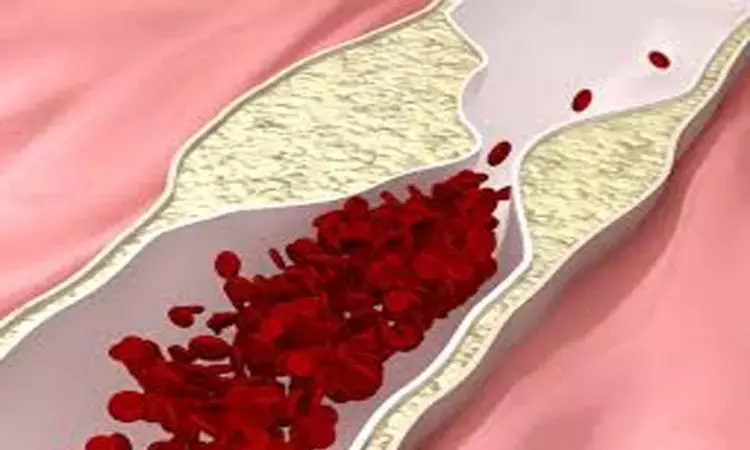- Home
- Medical news & Guidelines
- Anesthesiology
- Cardiology and CTVS
- Critical Care
- Dentistry
- Dermatology
- Diabetes and Endocrinology
- ENT
- Gastroenterology
- Medicine
- Nephrology
- Neurology
- Obstretics-Gynaecology
- Oncology
- Ophthalmology
- Orthopaedics
- Pediatrics-Neonatology
- Psychiatry
- Pulmonology
- Radiology
- Surgery
- Urology
- Laboratory Medicine
- Diet
- Nursing
- Paramedical
- Physiotherapy
- Health news
- Fact Check
- Bone Health Fact Check
- Brain Health Fact Check
- Cancer Related Fact Check
- Child Care Fact Check
- Dental and oral health fact check
- Diabetes and metabolic health fact check
- Diet and Nutrition Fact Check
- Eye and ENT Care Fact Check
- Fitness fact check
- Gut health fact check
- Heart health fact check
- Kidney health fact check
- Medical education fact check
- Men's health fact check
- Respiratory fact check
- Skin and hair care fact check
- Vaccine and Immunization fact check
- Women's health fact check
- AYUSH
- State News
- Andaman and Nicobar Islands
- Andhra Pradesh
- Arunachal Pradesh
- Assam
- Bihar
- Chandigarh
- Chattisgarh
- Dadra and Nagar Haveli
- Daman and Diu
- Delhi
- Goa
- Gujarat
- Haryana
- Himachal Pradesh
- Jammu & Kashmir
- Jharkhand
- Karnataka
- Kerala
- Ladakh
- Lakshadweep
- Madhya Pradesh
- Maharashtra
- Manipur
- Meghalaya
- Mizoram
- Nagaland
- Odisha
- Puducherry
- Punjab
- Rajasthan
- Sikkim
- Tamil Nadu
- Telangana
- Tripura
- Uttar Pradesh
- Uttrakhand
- West Bengal
- Medical Education
- Industry
Serum neuregulin 1, a potential noninvasive biomarker for detecting cardiometabolic risk in type 2 diabetes

Neuregulin 1 is one of the members of the members of the epidermal growth factors (EGF) proteins.
Egypt: A recent study published in Endocrinología, Diabetes y Nutrición has shed light on the possible role of Neuregulin 1 (NRG-1) as a potential biomarker for detecting cardiometabolic risk in type 2 diabetes (T2D).
The researchers found a robust relationship between serum NRG-1 levels and hyperglycemia, subclinical atherosclerosis, insulin resistance, and cardiac dysfunction in type 2 diabetes patients.
Neuregulin 1 is one of the members of the members of the epidermal growth factors (EGF) proteins. It was found to be released from the heart endothelial cells. It has antifibrotic and regenerative effects on the myocardium. NRG-1 and the ErbB receptors are expressed in the skeletal muscle, central nervous system, pulmonary cells, liver, kidney, and enterocytes.
There is a significant unmet clinical need for the identification of NRG-1's role in diabetes in humans and its relation to subclinical atherosclerosis, insulin resistance, and cardiovascular disease. To fill this knowledge gap, Emad Gamil Khidr, Al-Azhar University, Cairo, Egypt, and colleagues provide novel insights into the relationship between serum levels of NRG-1 and insulin resistance, subclinical atherosclerosis and cardiac dysfunction that occur in T2D.
The study included 50 patients with type 2 diabetes and 40 healthy gender- and age-matched controls. ELISA was used for measuring serum NRG-1. Lipid profiles, glycemic parameters, and insulin resistance were assessed. Carotid intima-media thickness (CIMT) and trans-thoracic echocardiography were studied for all study subjects.
The researchers reported the following findings:
- Type 2 diabetes patients had significantly lower serum NRG-1 levels than controls.
- Serum NRG-1 was negatively correlated with fasting blood glucose, age, HbA1c, blood urea, insulin resistance, serum creatinine and LDL-C, and positively correlated with HDL-C, eGFR and CIMT.
- Regarding echocardiographic variables, serum NRG-1 correlated positively with left ventricular global longitudinal strain and negatively with the E/Ea ratio.
- NRG-1 predicted subclinical atherosclerosis in type 2 diabetes patients at a cut-off value < 108.5 pg/ml with 78% sensitivity and 80% specificity.
"The findings point to the presence of a robust relationship between serum NRG-1 level and insulin resistance, cardiac dysfunction, and subclinical atherosclerosis in T2D patients," the researchers wrote. "Thus, NRG-1 may be a potential noninvasive biomarker for detecting cardiometabolic risk in T2D."
"Its positive effects on atherosclerosis and glucose metabolism render it a promising therapeutic target that merits further large-scale future studies," they concluded.
The limitation of the study is a relatively small study population sample size.
Reference:
Eldin, A. S., Fawzy, O., Mahmoud, E., Elaziz, O. H. A., Enayet, A. E. A., & Khidr, E. G. (2023). Serum neuregulin 1 in relation to ventricular function and subclinical atherosclerosis in type 2 diabetes patients. Endocrinología, Diabetes y Nutrición, 70(10), 619-627. https://doi.org/10.1016/j.endinu.2023.10.001
Dr Kamal Kant Kohli-MBBS, DTCD- a chest specialist with more than 30 years of practice and a flair for writing clinical articles, Dr Kamal Kant Kohli joined Medical Dialogues as a Chief Editor of Medical News. Besides writing articles, as an editor, he proofreads and verifies all the medical content published on Medical Dialogues including those coming from journals, studies,medical conferences,guidelines etc. Email: drkohli@medicaldialogues.in. Contact no. 011-43720751


